Windows下C++实现WEB服务器
计算机网络练习题(附参考答案)
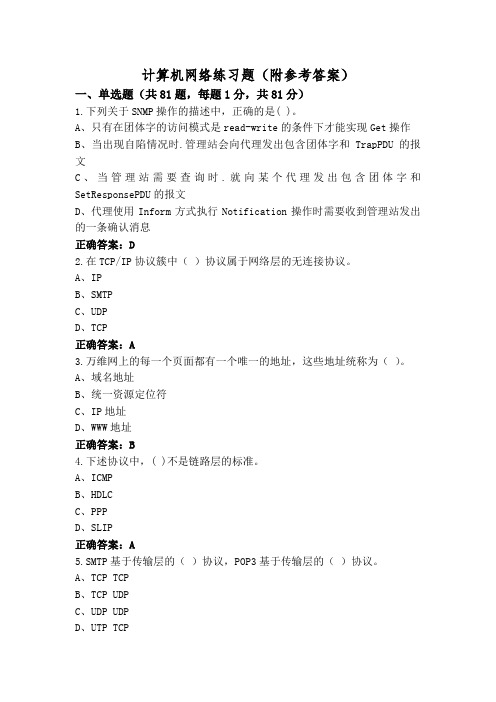
计算机网络练习题(附参考答案)一、单选题(共81题,每题1分,共81分)1.下列关于SNMP操作的描述中,正确的是( )。
A、只有在团体字的访问模式是read-write的条件下才能实现Get操作B、当出现自陷情况时.管理站会向代理发出包含团体字和TrapPDU的报文C、当管理站需要查询时.就向某个代理发出包含团体字和SetResponsePDU的报文D、代理使用Inform方式执行Notification操作时需要收到管理站发出的一条确认消息正确答案:D2.在TCP/IP协议簇中()协议属于网络层的无连接协议。
A、IPB、SMTPC、UDPD、TCP正确答案:A3.万维网上的每一个页面都有一个唯一的地址,这些地址统称为()。
A、域名地址B、统一资源定位符C、IP地址D、WWW地址正确答案:B4.下述协议中,( )不是链路层的标准。
A、ICMPB、HDLCC、PPPD、SLIP正确答案:A5.SMTP基于传输层的()协议,POP3基于传输层的()协议。
A、TCP TCPB、TCP UDPC、UDP UDPD、UTP TCP正确答案:A6.下列关于时分复用说法错误的是()。
A、每一个时分复用的用户在每一个TDM帧中占用固定序号的时隙B、每一个用户所占用的时隙是周期性地出现.其周期就是TDM帧的长度C、TDM信号也成为等分技术D、时分复用的所有用户是在不同的时间占用同样的频带宽度正确答案:C7.网络层的主要目的是()。
A、在任意节点间进行数据报传输B、在邻接节点间进行数据报可靠传输C、在邻接节点间进行数据报传输D、在任意节点间进行数据报可靠传输正确答案:A8.当集线器的某个端口收到数据后,具体操作为()。
A、从所有端口广播出去B、随机选择一个端口转发出去C、根据目的地址从合适的端口转发出去D、从除了输入端口外的所有端口转发出去正确答案:D9.下述的哪一种协议是不属于TCP/IP模型的协议()。
A、TCPB、UDPC、IGMPD、HDLC正确答案:D10.频分多路复用器将每路信号调制在()。
WWW服务器的配置1

一、WWW服务器的配置:1。
启动Microsoft管理控制台。
用户通过执行Windows2000Sever的“开始”“程序”“管理工具”“Interner服务管理器”命令便可启动Microsoft的管理控制台。
2。
新建Web站点。
选择要在其中建立Web站点的主机,然后单击“活动工具栏”中的“操作”按扭,在出现的菜单中的选择“新建”先面的“Web站点”一项,“Web站点创建向导”对话框就会出现在屏幕上。
按照“Web站点创建向导”的要求,分别输入“Web站点说明”、“Web站点使用的。
IP地址”、“TC P端口”、“主目录路径”、“权限”等信息。
3。
Web站点的启动与停止。
4。
创建虚拟目录。
选择要创建虚拟目录的站点,然后单击“活动工具栏”中的“操作”,选择“新建”下面的“虚拟目录”,然后按照“虚拟目录创建向导”的要求,完成。
5。
设置Web站点标志。
在需要设置的站点上右击,选择“属性”;在“Web站点标志”区域可以修改Web站点的相关信息。
此外,你还可以对其他内容进行设置。
6。
指定Web站点的操作员。
在你所建立的站点上,右击“属性”,点击“操作员”,单击“添加”,选择用户或者是组进行添加。
7。
在“属性”中,你还可以进行主目录,默认文档的设置。
8。
站点的访问控制的级别的设置,IP地址与域名限制的设置……二、Web Browser中文名称:网络浏览器或网页浏览器,简称浏览器英文名称:Web Browser浏览器是个显示网页伺服器或档案系统内的HTML文件,并让用户与此些文件互动的一种软件。
个人电脑上常见的网页浏览器包括微软的Internet Explorer、Mozilla 的Firefox、Opera和Safari。
浏览器是最经常使用到的客户端程序。
协定和标准网页浏览器主要通过HTTP协议连接网页伺服器而取得网页,HTTP容许网页浏览器送交资料到网页伺服器并且获取网页。
目前最常用的HTTP是HTTP/1.1,这个协议在RFC2616中被完整定义。
网络配置试题(含答案)及复习资料
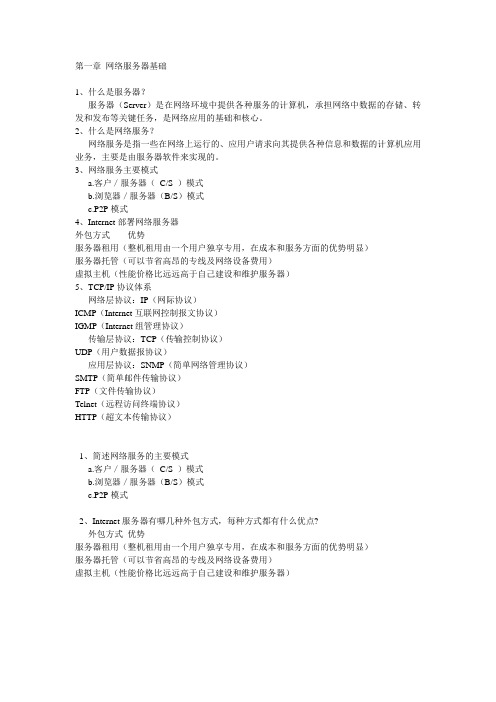
第一章网络服务器基础1、什么是服务器?服务器(Server)是在网络环境中提供各种服务的计算机,承担网络中数据的存储、转发和发布等关键任务,是网络应用的基础和核心。
2、什么是网络服务?网络服务是指一些在网络上运行的、应用户请求向其提供各种信息和数据的计算机应用业务,主要是由服务器软件来实现的。
3、网络服务主要模式a.客户/服务器(C/S )模式b.浏览器/服务器(B/S)模式c.P2P模式4、Internet部署网络服务器外包方式优势服务器租用(整机租用由一个用户独享专用,在成本和服务方面的优势明显)服务器托管(可以节省高昂的专线及网络设备费用)虚拟主机(性能价格比远远高于自己建设和维护服务器)5、TCP/IP协议体系网络层协议:IP(网际协议)ICMP(Internet互联网控制报文协议)IGMP(Internet组管理协议)传输层协议:TCP(传输控制协议)UDP(用户数据报协议)应用层协议:SNMP(简单网络管理协议)SMTP(简单邮件传输协议)FTP(文件传输协议)Telnet(远程访问终端协议)HTTP(超文本传输协议)1、简述网络服务的主要模式a.客户/服务器(C/S )模式b.浏览器/服务器(B/S)模式c.P2P模式2、Internet服务器有哪几种外包方式,每种方式都有什么优点?外包方式优势服务器租用(整机租用由一个用户独享专用,在成本和服务方面的优势明显)服务器托管(可以节省高昂的专线及网络设备费用)虚拟主机(性能价格比远远高于自己建设和维护服务器)3、简述TCP/IP的分层结构应用层表示层会话层[SMTP FTP HTTP Telnet SNMP DNS ]传输层[ TCP UDP ]网络层[ ICMP IP IGMP ][ARP RARP]4、简述合法的私有IP地址类型及其地址范围(A类)10.0.0.1~10.255.255.254 (B类)172.16.0.1~172.32.255.254(C类)192.168.0.1~192.168.255.2545、子网掩码有什么作用?将IP地址划分成网络地址和主机地址两部分,确定这个地址中哪一个部分是网络部分。
软件水平考试中级网络工程师上午基础知识试题-试卷1_真题-无答案
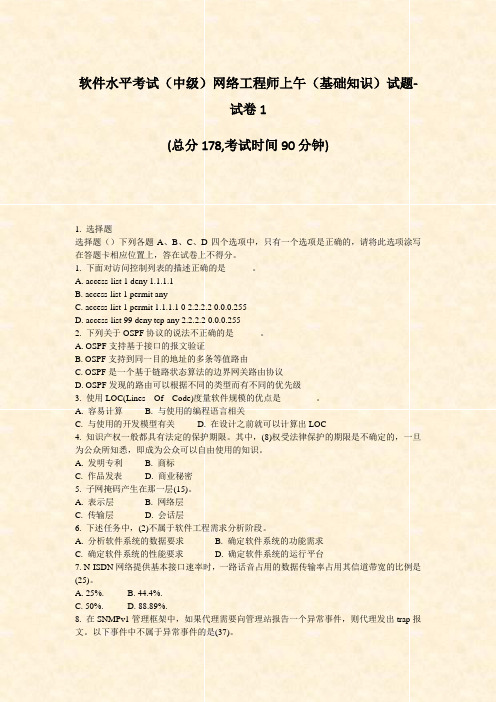
软件水平考试(中级)网络工程师上午(基础知识)试题-试卷1(总分178,考试时间90分钟)1. 选择题选择题()下列各题A、B、C、D四个选项中,只有一个选项是正确的,请将此选项涂写在答题卡相应位置上,答在试卷上不得分。
1. 下面对访问控制列表的描述正确的是______。
A. access-list 1 deny 1.1.1.1B. access-list 1 permit anyC. access-list 1 permit 1.1.1.1 0 2.2.2.2 0.0.0.255D. access-list 99 deny tcp any 2.2.2.2 0.0.0.2552. 下列关于OSPF协议的说法不正确的是______。
A. OSPF支持基于接口的报文验证B. OSPF支持到同一目的地址的多条等值路由C. OSPF是一个基于链路状态算法的边界网关路由协议D. OSPF发现的路由可以根据不同的类型而有不同的优先级3. 使用LOC(Lines Of Code)度量软件规模的优点是______。
A. 容易计算B. 与使用的编程语言相关C. 与使用的开发模型有关D. 在设计之前就可以计算出LOC4. 知识产权一般都具有法定的保护期限。
其中,(8)权受法律保护的期限是不确定的,一旦为公众所知悉,即成为公众可以自由使用的知识。
A. 发明专利B. 商标C. 作品发表D. 商业秘密5. 子网掩码产生在那一层(15)。
A. 表示层B. 网络层C. 传输层D. 会话层6. 下述任务中,(2)不属于软件工程需求分析阶段。
A. 分析软件系统的数据要求B. 确定软件系统的功能需求C. 确定软件系统的性能要求D. 确定软件系统的运行平台7. N-ISDN网络提供基本接口速率时,一路话音占用的数据传输率占用其信道带宽的比例是(25)。
A. 25%.B. 44.4%.C. 50%.D. 88.89%.8. 在SNMPv1管理框架中,如果代理需要向管理站报告一个异常事件,则代理发出trap报文。
Web服务器创建与管理习题及答案

Web服务器创建与管理习题及答案⼀、填空题1.URL格式:()://():()/⽂件路径。
2.⽹络服务器根据应⽤层次或规模档次可划分为:⼊门级服务器、( )、()和企业级服务器。
3.电⼦服务器使⽤()协议向外发送电⼦。
4.⽤户主要使⽤()协议访问互联⽹中的Web资源。
5.常⽤的IP地址级别分为3类,即()、()和()。
6.DNS区域分为两类:()和()。
7.在⼀台计算机上建⽴多个Web站点的⽅法有:利⽤多个()、利⽤多个()和利⽤多个主机头名称。
8.WWW协议使⽤的端⼝号是(),FTP协议使⽤的端⼝号是()和(), SMTP协议的标准TCP端⼝为(),POP3协议的标准TCP端⼝号为(),IMAP协议的标准TCP端⼝号为()9.⽤户使⽤_( ) 协议从电⼦服务器那⾥获取电⼦。
10.在搜索引擎中,根据搜索围可将搜索引擎分为()和()。
11.国际顶级域名分为()和()两种模式。
12.IPv4的地址是()位的⼆进制数,⽽IPv6是()位的⼆进制数。
13.电⼦系统由()、()和()组成的。
14.电⼦服务使⽤的两个最重要协议是:()协议和POP3协议。
15.列出五种Windows server 2003常⽤的⽹络服务()、()、()、()、()。
16.⽬前,应⽤于互联⽹上的流媒体发布⽅式主要有:单播、⼴播、多播和( )等四种⽅式。
17.使⽤Windows Media可以提供()和()等服务。
18.主要服务器操作系统⽬前有三种,即 Window 、()()。
19.TCP/IP配置完毕后,⽤命令Ping是()20.HOSTS⽂件实现的功能是()。
21.DHCP是⼀种简化主机IP配置管理的TCP/IP标准,全称()。
22.Web浏览器和服务器是通过()协议来建⽴连接、传输信息和终⽌连接。
23.IIS6.0通过分配TCP端⼝、()和()来运⾏和管理多个。
24.对于TCP/IP⽹络来说,()提供域名解析服务。
25.FTP全称为()协议,是⽤于TCP/IP⽹络及INTERNET的最简单协议之⼀。
C语言也能干大事之开发网站

练习
实现登陆表单,带“找回密码”链接。
Web开发原理及 编写原始CGI程序
登录过程分析
打开qq邮箱首页,填入用户名密码(输错),点击【登录】按钮,浏览器将 用户输入的用户名、密码发送给网站服务器,网站服务器让负责处理登录请 求的服务器程序来处理这个登录请求,处理程序判断用户名、密码是否正确 ,然后将判断结果返回给浏览器。 使用工具查看发送、返回报文理解:上网就是从服务器向浏览器传送 html 格 式描述的网页,每次请求都带回来新的页面;页面中的图片、js、css在单独的 请求中;
web开发原理及编写原始cgi程序登录过程分析打开qq邮箱首页填入用户名密码输错点击登录按钮浏览器将用户输入的用户名密码发送给网站服务器网站服务器让负责处理登录请求的服务器程序来处理这个登录请求处理程序判断用户名密码是否正确然后将判断结果返回给浏览器
C语言也能干大事 之 开发网站
如鹏网
学前说明
尽量使用Chrome浏览器,和讲课保持统一,避免浏览器差异性问题。 开发工具讲课用Visual Studio2012,大家用VS2010以上都可以,但是不要再用 VC6了。Vi输入标签的类型,共有10个值:文本框text、密码框 password、单选框radio、复选框checkbox、隐藏字段hidden、提 交按钮submit、重置按钮reset、按钮button、文件上传file、图像 image.
<SELECT>标签:定义一个选择列表
<select name="city"> <option value="1">北京</option> <option value="2">深圳</option> </select> 注:<option>:定义下拉列表中的选项,属性 selected 没有属性值 加在其中一个子项上,该子项就变成默认被选中项。
Web服务器的配置与管理实训报告

实训报告一数据库的基本管理一、数据库安全操作1、登陆管理任务1、将当前SQL Server实例的验证模式设置为“SQL Server和Windows验证模式.任务2、在当前数据库引擎中创建“Windows身份验证”登录名(对应的Windows用户名为winlogin)任务3、在当前数据库引擎中创建“SQL Server身份验证”登陆名为“newLogin”,密码为“123456”任务4、在当前数据库引擎中创建“SQL Server身份验证”登陆名为“sqlLogin”,密码为“123”任务5、查看sa用户的属性,并将其登录状态设为“启用”2、用户管理任务1、为数据库“Student”创建与newlogin登录名对应的数据库用户newuser,并查看其属性任务2、为数据库“Student”创建与sqlLogin登录名对应的数据库用户sqluser,并查看其属性任务3、为数据库“Student”创建与sqlLogin登录名对应的数据库用户testuser,并查看其属性任务3、将数据库用户testuser修改为win任务4、删除win3、服务器角色管理任务1、使用SSMS,将登录名“newlogin”添加到“sysadmin”固定服务器角色任务2、将登录名“newlogin”添加到“serveradmin”服务器角色中,并从sysadmin 服务器角色中删除“newLogin”4、数据库角色管理任务1、查看固定数据库角色db_owner的属性,将数据库用户sqluser添加到db_owner角色中任务2、查看固定数据库角色db_datawriter的属性,并将数据库用户newuser添加到该角色中任务3、创建用户定义数据库角色db_myuser,并将数据库用户sqluser添加到该角色中5、权限管理任务1、使用SSMS授予数据库用户sqluser对“Goods”表的查询权限,查看Goods表的权限属性任务2、授予sqluser对“Orders”表的插入和修改权限,并查看授权后的Orders 表的权限属性任务3、把在数据库中建立表的权限授予stud_user1任务4、用户Liu需要通过“学生信息管理系统”应用程序对数据库中的stud_info、lesson_info表进行查询(SELECT)、修改(UPDATE)和添加(INSERT)操作,但该用户不能使用SQL Server提供的工具访问tud_info或lesson_info表。
国企计算机专业能力测试题

国企计算机专业能力测试题
1.以下哪个不是网络服务的模式?
A.设计模式
B.共享模式
C.集约式模式
D.层次式模式
2.计算机系统功能最高的架构是?
A.数字处理系统
B.微处理器系统
C.分布式处理系统
D.多媒体处理系统
3.下列关于网络安全的叙述,正确的是?
A.加密是提高网络安全的最佳方法
B.网络安全的最佳实践是保持系统经常更新
C.网络防火墙是网络安全的核心
D.使用专用安全软件可以有效地防止网络攻击
4.关于系统管理,下列叙述中正确的是?
A.系统管理涉及到硬件、软件和用户之间的交互
B.系统管理在确保系统安全的同时不影响系统性能
C.系统管理通过建立政策来实现对资源的控制
D.系统管理不需要制定和实施可行的恢复计划
5.下列哪些是信息安全管理框架的主要原则?
A.保密性
B.可靠性
C.可用性
D.无线性
6.下列哪些软件通常用于管理网络服务器?
A. Apache Web服务器
B. IIS Web服务器
C. Windows服务器
D. Linux服务器
7.以下哪种技术可以有效抵御网络攻击?
A.层次型安全
B.入侵检测系统
C.认证技术
D.病毒检测系统
8.下列哪些是信息安全基础设施?
A.防火墙
B.身份验证
C.加密。
opensslwindows编译
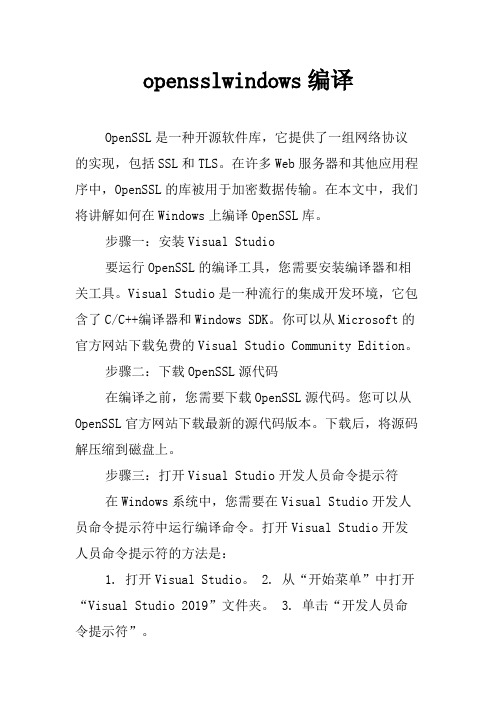
opensslwindows编译OpenSSL是一种开源软件库,它提供了一组网络协议的实现,包括SSL和TLS。
在许多Web服务器和其他应用程序中,OpenSSL的库被用于加密数据传输。
在本文中,我们将讲解如何在Windows上编译OpenSSL库。
步骤一:安装Visual Studio要运行OpenSSL的编译工具,您需要安装编译器和相关工具。
Visual Studio是一种流行的集成开发环境,它包含了C/C++编译器和Windows SDK。
你可以从Microsoft的官方网站下载免费的Visual Studio Community Edition。
步骤二:下载OpenSSL源代码在编译之前,您需要下载OpenSSL源代码。
您可以从OpenSSL官方网站下载最新的源代码版本。
下载后,将源码解压缩到磁盘上。
步骤三:打开Visual Studio开发人员命令提示符在Windows系统中,您需要在Visual Studio开发人员命令提示符中运行编译命令。
打开Visual Studio开发人员命令提示符的方法是:1. 打开Visual Studio。
2. 从“开始菜单”中打开“Visual Studio 2019”文件夹。
3. 单击“开发人员命令提示符”。
步骤四:设置OpenSSL编译选项为了编译正确的代码,您需要设置一些编译选项。
在Visual Studio开发人员命令提示符中运行以下命令:1. 进入OpenSSL源代码目录:cd C:\your\path\to\openssl(请将“C:\your\path\to\openssl”替换为您下载OpenSSL源代码的路径。
)2. 进入config目录:cd config3. 运行“perl Configure”命令,进行配置:perl Configure VC-WIN32(如果您使用的是64位系统,请使用以下命令:)perl Configure VC-WIN64A4. 运行“ms\do_ms”命令生成Makefile文件:ms\do_ms步骤五:编译OpenSSL库现在,您可以编译OpenSSL库了。
Windows_Server_2008上使用IIS搭建WEB服务器、CA数字证书应用图解(全)
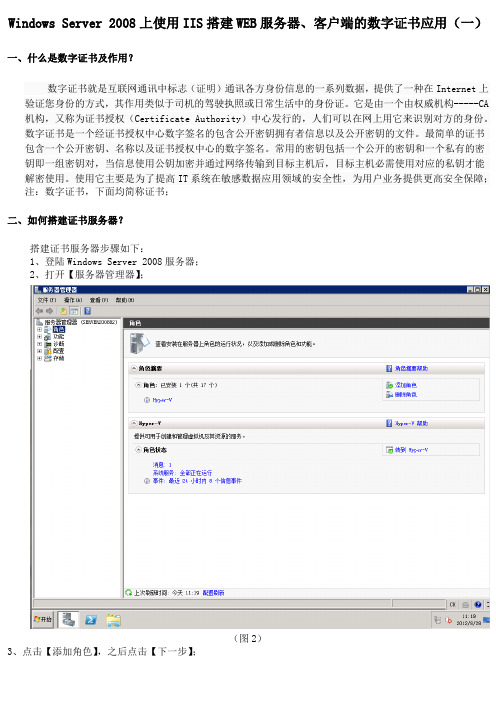
Windows Server 2008上使用IIS搭建WEB服务器、客户端的数字证书应用(一)一、什么是数字证书及作用?数字证书就是互联网通讯中标志(证明)通讯各方身份信息的一系列数据,提供了一种在Internet上验证您身份的方式,其作用类似于司机的驾驶执照或日常生活中的身份证。
它是由一个由权威机构-----CA 机构,又称为证书授权(Certificate Authority)中心发行的,人们可以在网上用它来识别对方的身份。
数字证书是一个经证书授权中心数字签名的包含公开密钥拥有者信息以及公开密钥的文件。
最简单的证书包含一个公开密钥、名称以及证书授权中心的数字签名。
常用的密钥包括一个公开的密钥和一个私有的密钥即一组密钥对,当信息使用公钥加密并通过网络传输到目标主机后,目标主机必需使用对应的私钥才能解密使用。
使用它主要是为了提高IT系统在敏感数据应用领域的安全性,为用户业务提供更高安全保障;注:数字证书,下面均简称证书;二、如何搭建证书服务器?搭建证书服务器步骤如下:1、登陆Windows Server 2008服务器;2、打开【服务器管理器】;(图2)3、点击【添加角色】,之后点击【下一步】;(图3)4、找到【Active Directory证书服务】勾选此选项,之后点击【下一步】;(图4)5、进入证书服务简介界面,点击【下一步】;(图5)6、将证书颁发机构、证书颁发机构WEB注册勾选上,然后点击【下一步】;(图6)7、勾选【独立】选项,点击【下一步】;(由于不在域管理中创建,直接默认为:“独立”)(图7)8、首次创建,勾选【根CA】,之后点击【下一步】;(图8)9、首次创建勾选【新建私钥】,之后点击【下一步】;(图9)10、默认,继续点击【下一步】;(图10)11、默认,继续点击【下一步】;(图11)12、默认,继续点击【下一步】;(图12)13、默认,继续点击【下一步】;(图13)14、点击【安装】;(图14)15、点击【关闭】,证书服务器安装完成;(图15)Wind ows Server 2008上使用IIS如何配置WEB服务器上证书应用(SSL应用)?此应用用于提高WEB站点的安全访问级别;配置后应用站点可实现安全的服务器至客户端的信道访问;此信道将拥有基于SSL证书加密的HTTP安全通道,保证双方通信数据的完整性,使客户端至服务器端的访问更加安全;注:以证书服务器创建的WEB站点为示例,搭建WEB服务器端SSL证书应用步骤如下:1、打开IIS,WEB服务器,找到【服务器证书】并选中;(图1)2、点击【服务器证书】,找到【创建证书申请】项;(图2)3、单击【创建证书申请】,打开【创建证书申请】后,填写相关文本框,填写中需要注意的是:“通用名称”必需填写本机IP或域名,其它项则可以自行填写;注:下面的192.168.1.203为示例机IP地址,实际IP地址需根据每人主机IP自行填写;填写完后,单击【下一步】;(图3)4、默认,点击【下一步】;(图4)5、选择并填写需要生成文件的保存路径与文件名, 此文件后期将会被使用;(保存位置、文件名可以自行设定),之后点击【完成】,此配置完成,子界面会关闭;(图5)6、接下来,点击IE(浏览器),访问:http://192.168.1.203/certsrv/;注:此处的192.168.1.203为示例机IP地址,实际IP地址需根据每人主机IP自行填写;(图6-1)此时会出现证书服务页面;此网站如果点击【申请证书】,进入下一界面点击【高级证书申请】,进入下一界面点击【创建并向此CA提交一个申请】,进入下一界面,此时会弹出一个提示窗口:“为了完成证书注册,必须将该CA的网站配置为使用HTTPS身份验证”;也就是必须将HTTP网站配置为HTTPS的网站,才能正常访问当前网页及功能;(图6-2)在进行后继内容前,相关术语名词解释:HTTPS(全称:Hypertext Transfer Protocol over Secure Socket Layer),是以安全为目标的HTTP通道,简单讲是HTTP的安全版。
基于Web的C语言教学系统的设计与实现
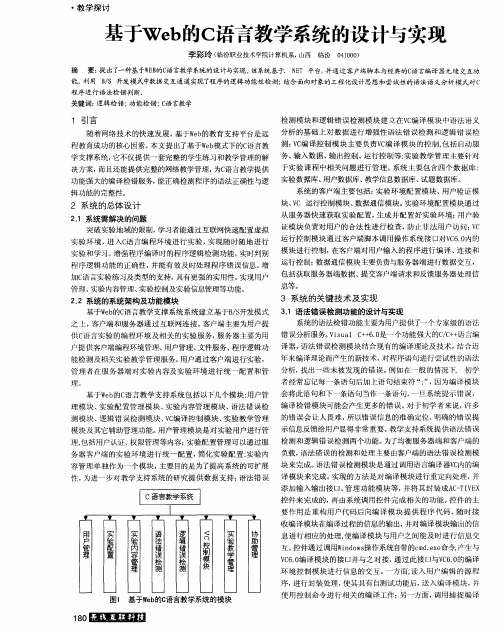
务器 客户端 的实 验环境进 行统一配 置,简化实验配 置 :实验 内 负载 ,语法错误的检测和处理主要 由客户端 的语法错 误检测模
容管理 单独作为一个模块 ,主要 目的是为了提 高系统的可扩展 块 来完 成。语法错 误检 测模 块是通过调用语言编译器Vc内的编
性 ,为进一步对教学支持系统的研究提供 数据支持 ;语法错误 译模块来完成 。实现 的方法是对编译模 块进行重 定向处理 ,并
测 模块 、逻辑错误检 测模块、Vc编译控制模 块、实验教学 管理 的 错 误 会 让 人畏 难 ,所 以错 误 信 息 的 准 确 定位 、明确 的错 误 提
模块 及其它辅助管理功能。用户管理模块是对 实验用户进行管 示信息反馈 给用户显得 非常 重要。教学支持系统提供 语法 错误
理 ,包括用户认证、权 限管理等内容 ;实验配置管理可 以通过服 检 测和逻辑错误 检测两个功 能。为了均衡服务器端和客户端 的
实验 环境 ,进入c语言编程环 境进行实验 ,实现随时 随地 进行 运 行控 制模块通 过客户端脚本调用操作系统 接口对VC6.O内的
实验 和学习。增强 程序编译 时的程序逻辑 检测功能,实时判别 模 块进行控制 ,在客户端对用户输入 的程 序进 行编译 、连 接和
程 序逻 辑功能的正确性,并能有 效及 时处理程 序错误信息。增 运 行控制 ;数据通信模块 主要负责与服务器端 进行数 据交互 ,
学支撑系统 ,它不仅提供一套完 整的学生练习和 教学 管理的解 务、输入数据、输出控制、运行控制等 :实验 教学管理主要针对
决方案 ,而且还能提 供完整的网络教学管理 ,为C语言教学提供 于实验课程 中相 关问题 进行管理 。系统主要包含 四个数据 库 :
国家开放大学《Windows网络操作系统管理》复习题

一、填空题1.(A.专用网络)通常用来承载群集节点内部通信。
群集节点使用这个网络交换检测信号并检查其他节点。
A.专用网络B.公共网络C.存储网络D.虚拟机网络2.(B..PFX)格式的证书文件包含私有密钥。
A..CER B..PFX C..P7B D.SST3.(B.Guest )是“内置的本地用户帐户”。
(单选)A.Administrators B.Guest C.Power Users D.Domain Admins操作系统会自动创建四个本地用户帐户:Administrator、Guest、DefaultAccount、WDAGUtilityAccount)4.(B.Hyper-V )是微软公司提供的虚拟化平台,能够在服务器上创建并运行虚拟机。
A.Intel VT B.Hyper-V C.AMD-V D.AMD x645.(A.条件转发器)能够将不同域名的查询转发给不同的转发器A.条件转发器B.根提示C.转发器D.辅助区域6.(AAAA记录)用来将主机的FQDN 解析为IPv4地址。
A.AAAA记录B.MX记录C.A记录D.PTR记录7.(B.心跳)是群集的一种健康检查机制,通过一个专用网络向群集所有节点发送UDP数据包,以检查群集中的所有节点是否在线。
A.资源B.心跳C.存储D.角色8.(C.iisstart.html)是IIS的默认站点中的默认文档。
A.Default.htm B.Default.aspx C.iisstart.html D.index.asp9.Hyper-V提供了三种虚拟网络:(A.专用)网络、内部网络和外部网络。
A.专用B.并联C.串联D.环形10.IIS默认站点的根目录位于(A.C:\inetpub\wwwroot)。
A.C:\inetpub\wwwroot B.C:\inetpub\custerr C.C:\inetpub\logs D.C:\inetpub\web11.MBR分区表格式只支持最大为(B.2TB )的磁盘。
网络安全管理员模拟练习题+答案
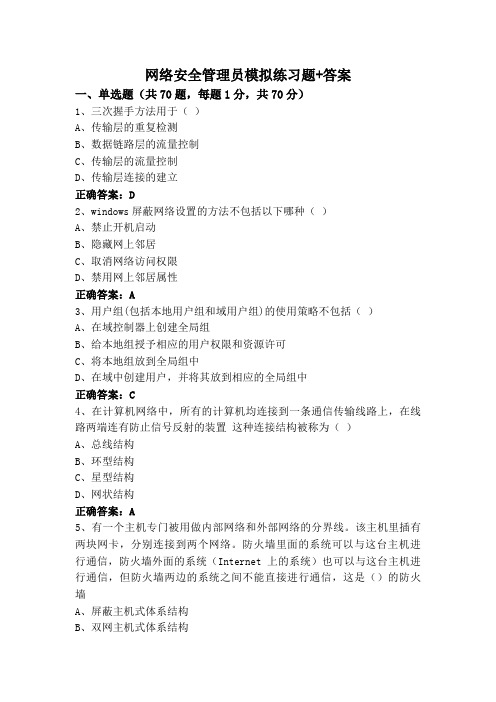
网络安全管理员模拟练习题+答案一、单选题(共70题,每题1分,共70分)1、三次握手方法用于()A、传输层的重复检测B、数据链路层的流量控制C、传输层的流量控制D、传输层连接的建立正确答案:D2、windows屏蔽网络设置的方法不包括以下哪种()A、禁止开机启动B、隐藏网上邻居C、取消网络访问权限D、禁用网上邻居属性正确答案:A3、用户组(包括本地用户组和域用户组)的使用策略不包括()A、在域控制器上创建全局组B、给本地组授予相应的用户权限和资源许可C、将本地组放到全局组中D、在域中创建用户,并将其放到相应的全局组中正确答案:C4、在计算机网络中,所有的计算机均连接到一条通信传输线路上,在线路两端连有防止信号反射的装置这种连接结构被称为()A、总线结构B、环型结构C、星型结构D、网状结构正确答案:A5、有一个主机专门被用做内部网络和外部网络的分界线。
该主机里插有两块网卡,分别连接到两个网络。
防火墙里面的系统可以与这台主机进行通信,防火墙外面的系统(Internet上的系统)也可以与这台主机进行通信,但防火墙两边的系统之间不能直接进行通信,这是()的防火墙A、屏蔽主机式体系结构B、双网主机式体系结构C、筛选路由式体系结构D、屏蔽子网式体系结构正确答案:A6、在数据库中,下列说法不正确的是()。
A、数据库中的数据可以共享B、数据库减少了数据冗余C、若系统是完全可以控制的,则系统可保证更新时的一致性D、数据库避免了一切数据重复正确答案:D7、OSPF协议是( )A、应用层协议B、域内路由协议C、域间路由协议D、无域路由协议正确答案:B8、HTML的正式名称是( )A、超文本标记语言B、WWW编程语言C、主页制作语言D、Internet编程语言正确答案:A9、目前网络应用系统采用的主要模型是( )A、网络/文件服务器计算模型B、离散个人计算模型C、客户/服务器计算模型D、主机计算模型正确答案:C10、表明当前shell中可执行程序的默认搜索路径的是以下哪个系统环境变量()A、无正确答案B、routeC、pathD、locat正确答案:A11、为了保证计算机信息安全,通常使用(),以使计算机只允许用户在输入正确的保密信息时进入系统A、命令B、密钥C、密码D、口令正确答案:C12、用人单位自用工之日起()不与劳动者订立书面劳动合同的,视为用人单位与劳动者已订立无固定期限劳动合同。
WWW服务器的配置

3-3-25
进程间通信文件
CUUG
Httpd守护进程的加锁文件。 LockFile /usr/local/httpd/logs/httpd.lock 进程文件:指定记录服务器进程号的文件 PidFile logs/httpd.pid 控制服务器与父进程和子进程通信的文件 ScoreBoardFile logs/httpd.scoreboard
1. 安装后产生的目录
bin:存放Apache的可执行程序 cgi-bin:公共网关接口程序,用于存放用户的CGI程序 conf:配置文件存放的目录 htdocs:默认的存放用户页面的目录 icons:存放图标的目录 logs:存放日志的目录
2. Apache的配置文件
httpd.conf: httpd守护进程在启动时读取该文件 access.conf:对于WWW资源访问实施控制的文件 srm.conf:数据设置文件,设置WWW服务器读取文件的目录、CGI执 行的目录等 3-3-23
3-3-29
服务器端口设置
CUUG
端口设置: 指定HTTP协议接收客户请求的端口,默认80 Port 80 定义了Standalone模式下httpd守护进程使用的端口,该选项只对独 立方式启动服务器才有效。对于以inetd方式启动的服务器在 inetd.conf中定义使用哪个端口。 指定HTTP协议监听的端口,默认监听所有IP地址和由port指令指 定的端口。格式: Listen 端口 Listen IP地址:端口
UNIX使用与网络管理
——WWW服务器配置 ——WWW服务器配置
CUUG
中国UNIX用户协会培训中心
版权所有, 2004 (c) 中国UNIX用户协会培训中心 Facesmile
C上传文件到服务器(含接收端源码)

C上传⽂件到服务器(含接收端源码)实例向⼤家展⽰了如何⽤Visual C#实现⽹络⽂件的下载,使⽤Visual C#进⾏Internet通讯编程是⾮常⽅便的。
在上⾯的程序中,我们仅仅⽤到了WebClient类的⼀些⽅法,⽽WebClient类不光提供了⽹络⽂件下载的⽅法,还提供了⽂件上传的⽅法【实例简介】⼀.概述:本⽂通过⼀个实例向⼤家介绍⽤Visual C#进⾏Internet通讯编程的⼀些基本知识。
我们知道.Net类包含了请求/响应层、应⽤协议层、传输层等层次。
在本程序中,我们运⽤了位于请求/响应层的WebRequest类以及WebClient类等来实现⾼抽象程度的Internet通讯服务。
本程序的功能是完成⽹络⽂件的下载。
⼆.实现原理:程序实现的原理⽐较简单,主要⽤到了WebClient类和FileStream类。
其中WebClient类处于名字空间中,该类的主要功能是提供向URI标识的资源发送数据和从URI标识的资源接收数据的公共⽅法。
我们利⽤其中的DownloadFile()⽅法将⽹络⽂件下载到本地。
然后⽤FileStream类的实例对象以数据流的⽅式将⽂件数据写⼊本地⽂件。
这样就完成了⽹络⽂件的下载。
三.实现步骤:⾸先,打开Visual ,新建⼀个Visual C# Windows应⽤程序的⼯程,不妨命名为"MyGetCar"。
接着,布置主界⾯。
我们先往主窗体上添加如下控件:两个标签控件、两个⽂本框控件、⼀个按钮控件以及⼀个状态栏控件。
最终的主窗体如下图所⽰:完成主窗体的设计,我们接着完成代码的编写。
在理解了基本原理的基础上去完成代码的编写是相当容易。
程序中我们主要⽤到的是WebClient类,不过在我们调⽤WebClient类的实例对象前,我们需要⽤WebRequest类的对象发出对统⼀资源标识符(URI)的请求。
try{WebRequest myre=WebRequest.Create(URLAddress);}catch(WebException exp){MessageBox.Show(exp.Message,"Error");}这是⼀个try-catch语句,try块完成向URI的请求,catch块则捕捉可能的异常并显⽰异常信息。
信息通信网络运行管理员专业技能知识练习题及答案
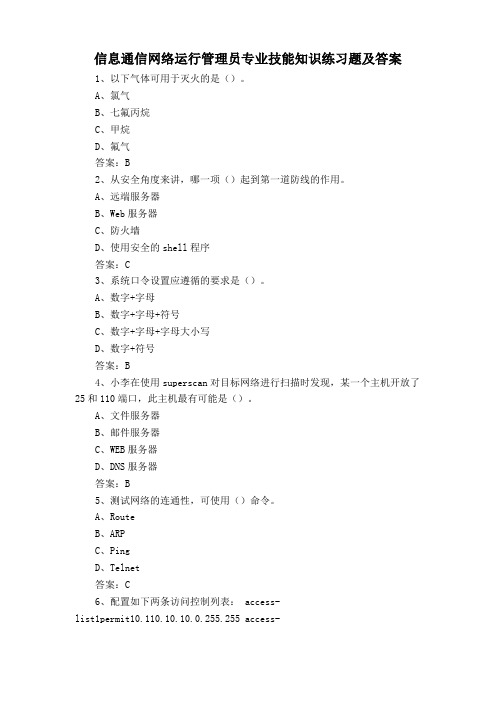
信息通信网络运行管理员专业技能知识练习题及答案1、以下气体可用于灭火的是()。
A、氯气B、七氟丙烷C、甲烷D、氟气答案:B2、从安全角度来讲,哪一项()起到第一道防线的作用。
A、远端服务器B、Web服务器C、防火墙D、使用安全的shell程序答案:C3、系统口令设置应遵循的要求是()。
A、数字+字母B、数字+字母+符号C、数字+字母+字母大小写D、数字+符号答案:B4、小李在使用superscan对目标网络进行扫描时发现,某一个主机开放了25和110端口,此主机最有可能是()。
A、文件服务器B、邮件服务器C、WEB服务器D、DNS服务器答案:B5、测试网络的连通性,可使用()命令。
A、RouteB、ARPC、PingD、Telnet答案:C6、配置如下两条访问控制列表: access-list1permit10.110.10.10.0.255.255 access-list2permit10.110.100.1000.0.255.255 访问控制列表1和2,所控制的地址范围关系是()。
A、1和2的范围相同B、1的范围在2的范围内C、2的范围在1的范围内D、1和2的范围没有包含关系答案:A7、在Windows操作系统中,()命令能够显示ARP表项信息。
A、display arpB、arp – aC、arp – dD、show arp答案:B8、下面对“零日(zero-day)漏洞”的理解中,正确的是()。
A、指一个特定的漏洞,该漏洞每年1月1日零点发作,可以被攻击者用来远程攻击,获取主机权限B、指一个特定的漏洞,特指在2010年被发现出来的一种漏洞,该漏洞被“震网”病毒所利用,用来攻击伊朗布什尔核电站基础设施C、指一类漏洞,即特别好被利用,一旦成功利用该类漏洞,可以在1天内完成攻击,且成功达到攻击目标D、指一类漏洞,即刚被发现后立即被恶意利用的安全漏洞,一般来说,那些已经被小部分人发现,但是还未公开、还不存在安全补丁的漏洞是零日漏洞答案:D9、C/S的网络工作模式是()。
主机/终端和C/S都[整理版]
![主机/终端和C/S都[整理版]](https://img.taocdn.com/s3/m/ddf0491dba68a98271fe910ef12d2af90242a875.png)
B/S结构(Browser/Server结构)结构即浏览器和服务器结构。
它是随着Internet技术的兴起,对C/S结构的一种变化或者改进的结构。
在这种结构下,用户工作界面是通过WWW浏览器来实现,极少部分事务逻辑在前端(Browser)实现,但是主要事务逻辑在服务器端(Server)实现,形成所谓三层3-tier结构。
这样就大大简化了客户端电脑载荷,减轻了系统维护与升级的成本和工作量,降低了用户的总体成本(TCO)。
以目前的技术看,局域网建立B/S结构的网络应用,并通过Internet/Intranet模式下数据库应用,相对易于把握、成本也是较低的。
它是一次性到位的开发,能实现不同的人员,从不同的地点,以不同的接入方式(比如LAN, WAN, Internet/Intranet等)访问和操作共同的数据库;它能有效地保护数据平台和管理访问权限,服务器数据库也很安全。
特别是在JAVA这样的跨平台语言出现之后,B/S架构管理软件更是方便、速度快、效果优。
随着Internet和WWW的流行,以往的主机/终端和C/S都无法满足当前的全球网络开放、互连、信息随处可见和信息共享的新要求,于是就出现了B/S型模式,即浏览器/服务器结构。
B/S模式最大特点是:用户可以通过WWW浏览器去访问Internet上的文本、数据、图像、动画、视频点播和声音信息,这些信息都是由许许多多的Web服务器产生的,而每一个Web服务器又可以通过各种方式与数据库服务器连接,大量的数据实际存放在数据库服务器中。
客户端除了WWW浏览器,一般无须任何用户程序,只需从Web服务器上下载程序到本地来执行,在下载过程中若遇到与数据库有关的指令,由Web服务器交给数据库服务器来解释执行,并返回给Web 服务器,Web服务器又返回给用户。
在这种结构中,将许许多多的网连接到一块,形成一个巨大的网,即全球网。
而各个企业可以在此结构的基础上建立自己的Intranet。
- 1、下载文档前请自行甄别文档内容的完整性,平台不提供额外的编辑、内容补充、找答案等附加服务。
- 2、"仅部分预览"的文档,不可在线预览部分如存在完整性等问题,可反馈申请退款(可完整预览的文档不适用该条件!)。
- 3、如文档侵犯您的权益,请联系客服反馈,我们会尽快为您处理(人工客服工作时间:9:00-18:30)。
/topic/368943自己研究了好几天终于写出来一个,哈哈,当然也从网上得到了很多的帮助拉。
谢谢大家咯!这个版本还不是很完善,但Web服务器的基本框架已经出来了,还有部分的功能需要进行进一步的测试和修改。
虽然说C的开发比较慢,对于程序员来说比较难以操作,但通过用C写这些很底层的东西,可以更好的了解的象java的socket中的工作原理。
有一定的帮助!以下是源代码:#include <winsock.h>#include <sys/stat.h>#include <iostream>using namespace std;#define SERVER_PORT 10000 //自定义的服务端口#define HOSTLEN 256 //主机名长度#define BACKLOG 10 //同时等待的连接个数int sendall(int s, char *buf, int *len) {int total = 0; // 已经发送字节数int bytesleft = *len; //还剩余多少字节int n;while(total < *len) {n = send(s, buf+total, bytesleft, 0);if (n == -1) { break; }total += n;bytesleft -= n;}*len = total; // 返回实际发送出去的字节数return n==-1?-1:0; // 成功发送返回0 失败-1}void wrong_req(int sock) {char* error_head = "HTTP/1.0 501 Not Implemented\r\n"; //输出501错误 int len = strlen(error_head);if (sendall(sock, error_head, &len) == -1) { //向客户发送printf("Sending failed!");return;}char* error_type = "Content-type: text/plain\r\n";len = strlen(error_type);if (sendall(sock, error_type, &len) == -1) {printf("Sending failed!");return;}char* error_end = "\r\n";len = strlen(error_end);if (sendall(sock, error_end, &len) == -1) {printf("Sending failed!");return;}char* prompt_info = "The command is not yet completed\r\n";len = strlen(prompt_info);if (sendall(sock, prompt_info, &len) == -1) {printf("Sending failed!");return;}}bool not_exit(char* arguments) {struct stat dir_info;return (stat(arguments, &dir_info) == -1);}void file_not_found(char* arguments, int sock) {char* error_head = "HTTP/1.0 404 Not Found\r\n"; //构造404错误head int len = strlen(error_head);if (sendall(sock, error_head, &len) == -1) { //向客户端发送printf("Sending error!");return;}char* error_type = "Content-type: text/plain\r\n";len = strlen(error_type);if (sendall(sock, error_type, &len) == -1) {printf("Sending error!");return;}char* error_end = "\r\n";len = strlen(error_end);if (sendall(sock, error_end, &len) == -1) {printf("Sending error!");return;}char prompt_info[50] = "Not found: ";strcat(prompt_info, arguments);len = strlen(prompt_info);if (sendall(sock, prompt_info, &len) == -1) { //输出未找到的文件printf("Sending error!");return;}}void send_header(int send_to, char* content_type) {char* head = "HTTP/1.0 200 OK\r\n"; //正确的头部信息int len = strlen(head);if (sendall(send_to, head, &len) == -1) { //向连接的客户端发送数据 printf("Sending error");return;}if (content_type) { //content_type不为空char temp_1[30] = "Content-type: "; //准备好要连接的字串strcat(temp_1, content_type); //构造content_typestrcat(temp_1, "\r\n");len = strlen(temp_1);if (sendall(send_to, temp_1, &len) == -1) {printf("Sending error!");return;}}}char* file_type(char* arg) {char * temp; //临时字符串指针if ((temp=strrchr(arg,'.')) != NULL) { //取得后缀return temp+1;}return ""; //如果请求的文件名中没有. 则返回空串}void send_file(char* arguments, int sock) {char* extension = file_type(arguments); //获得文件后缀名char* content_type = "text/plain"; //初始化type='text/plain'FILE* read_from; //本地文件指针从该文件中读取.html .jpg等int readed = -1; //每次读得的字节数if (strcmp(extension, "html") == 0) { //发送内容为htmlcontent_type = "text/html";}if (strcmp(extension, "gif") == 0) { //发送内容为gifcontent_type = "image/gif";}if (strcmp(extension, "jpg") == 0) { //发送内容为jpgcontent_type = "image/jpg";}read_from = fopen(arguments, "r"); //打开用户指定的文件准备读取 if(read_from != NULL) { //指针不为空char read_buf[128]; //读文件时的字节缓存数组send_header(sock, content_type); //发送协议头send(sock, "\r\n", 2, 0); //再加一个"\r\n" 不能缺少格式要求while(!feof(read_from)) { //判断文件是否已经结束fgets(read_buf, 128, read_from); //读取int len = strlen(read_buf);if (sendall(sock, read_buf, &len) == -1) { //发送数据printf("Sending error!"); //出现发送错误显示到控制台继续发送 continue;}}}}void handle_req(char* request, int client_sock) {char command[BUFSIZ]; //保存解析到的命令字段 GET PUTchar arguments[BUFSIZ]; //保存解析到的请求的文件strcpy(arguments, "./"); //注意该符号在不同操作系统的区别if (sscanf(request, "%s%s", command, arguments+2) != 2) {return; //解析出错在返回}printf("handle_cmd: %s\n",command); //向控制台输出此时的命令 printf("handle_path: %s\n",arguments); //向控制台输出此时的请求路径if (strcmp(command, "GET") != 0) { //请求命令格式是否正确wrong_req(client_sock);return;}if (not_exit(arguments)) { //请求的文件是否存在file_not_found(arguments, client_sock);return;}send_file(arguments, client_sock); //命令格式及请求路径正确则发送数据return;}int make_server_socket() {struct sockaddr_in server_addr; //服务器地址结构体int tempSockId; //临时存储socket描述符tempSockId = socket(PF_INET, SOCK_STREAM, 0);if (tempSockId == -1) { //如果返回值为-1 则出错return -1;}server_addr.sin_family = AF_INET;server_addr.sin_port = htons(SERVER_PORT);server_addr.sin_addr.s_addr = inet_addr("127.0.0.1"); //本地地址memset(&(server_addr.sin_zero), '\0', 8);if (bind(tempSockId, (struct sockaddr *)&server_addr,sizeof(server_addr)) == -1) { //绑定服务如果出错则返回-1printf("bind error!\n");return -1;}if (listen(tempSockId, BACKLOG) == -1 ) { //开始监听printf("listen error!\n");return -1;}return tempSockId; //返回取得的SOCKET}void main(int argc, char * argv[]) {WSADATA wsaData;if (WSAStartup(MAKEWORD(1, 1), &wsaData) != 0) {fprintf(stderr, "WSAStartup failed.\n");exit(1);}printf("My web server started...\n");int server_socket; //服务器的socketint acc_socket; //接收到的用户连接的socketint sock_size = sizeof(struct sockaddr_in);struct sockaddr_in user_socket; //客户连接信息server_socket = make_server_socket(); //创建服务器端的socketif (server_socket == -1) { //创建socket出错printf("Server exception!\n");exit(2);}while(true) {acc_socket = accept(server_socket, (struct sockaddr *)&user_socket, &sock_size); //接收连接//cout << inet_ntoa(user_socket.sin_addr) << endl; //测试用:-)//int numbytes;char buf[100];if ((numbytes=recv(acc_socket, buf, 99, 0)) == -1) {perror("recv");exit(1);}//printf("buf ... %s", buf); //测试用handle_req(buf, acc_socket);}}和我的上一篇文章是一起写的,呵呵,大家给提点意见啊。
